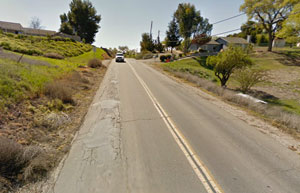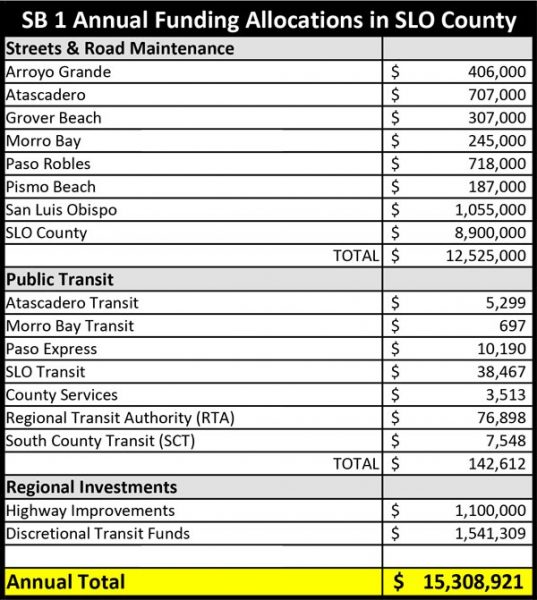State transportation bill could send $718,000 a year to Paso Robles
Bill provides $5.24 billion per year in transportation funds to state with $15.3 million per year coming back to SLO County
–The California State Legislature recently passed a landmark road repair and transportation investment package totaling $5.24 billion per year, with approximately $15.3 million per year invested in the San Luis Obispo region.
California has not increased the gas tax in 23 years. Since then, the state’s population has grown by eight million people, with millions more cars and trucks on our roads, yet road and transit investments have not kept pace with this growth, according to a statement by the San Luis Obispo Council of Governments (SLOCOG).
This transportation spending package will be funded by everyone who uses roads and highways:
- $7.3 billion by increasing diesel excise tax 20 cents;
- $3.5 billion by increasing diesel sales tax to 5.75 percent;
- $24.4 billion by increasing gasoline excise tax 12 cents;
- $16.3 billion from an annual transportation improvement fee based on a vehicle’s value;
- $200 million from an annual $100 Zero Emission Vehicle fee commencing in 2020; and
- $706 million in General Fund loan repayments.
“This legislation marks a major milestone in the state’s commitment to our transportation system,” said Ron De Carli, SLOCOG Executive Director. “The SLO region will benefit immensely in increased funds for highway, street and road maintenance and repair, and support of transit services. With a focus on ‘Fix it First’ there is little funding provided in the bill for transportation improvements that address congestion relief on Highway 101 through South County and Highway 277, or other needed interchange improvements. While it provides significant funding, it addresses only a third of the statewide street, road and highway maintenance needs and half of our local street and road maintenance needs.”
The table below breaks out the $15.3 million in funding allocations for street and road maintenance by jurisdiction and public transit by operator:
The legislation, the Road Repair and Accountability Act of 2017, SB 1 (Beall), invests $52.4 billion over the next decade – split equally between state and local investments.
Fix Local Streets and Transportation Infrastructure (50 percent) annual allocation:
- $1.5 billion in “Fix-It-First” local road repairs, including fixing potholes
- $750 million to improve local public transportation
- $200 million to support local “self-help” communities that are making their own investments in transportation improvements
- $100 million to improve infrastructure that promotes walking and bicycling
- $82 million for the State Transportation Improvement Program (highway congestion)
- $25 million in local transportation planning grants
Fix State Highways and Transportation Infrastructure (50 percent) annual allocation:
- $1.5 billion in “Fix-it-First” highway repairs, including smoother pavement
- $400 million in bridge and culvert repairs
- $300 million to improve trade corridors
- $250 million to reduce congestion on major commute corridors
- $140 million in other transportation investments, including $275 million for highway and intercity-transit improvements
- $25 million freeway service patrols
Also included in the legislation were a number of bipartisan reforms, including:
- Constitutional amendment to prohibit spending the funds on anything but transportation
- Inspector General to ensure Caltrans and any entities receiving state transportation funds spend taxpayer dollars efficiently, effectively and in compliance with state and federal requirements
- Provision that empowers the California Transportation Commission to hold state and local government accountable for making the transportation improvements they commit to delivering
- Authorization for the California Transportation Commission to review and allocate Caltrans funding and staffing for highway maintenance to ensure those levels are reasonable and responsible
- Authorization for Caltrans to complete earlier mitigation of environmental impacts from construction, a policy that will reduce costs and delays while protecting natural resources
- Requirement for Caltrans to consider “complete streets” (bike/ped) in all non-freeway highway projects






















